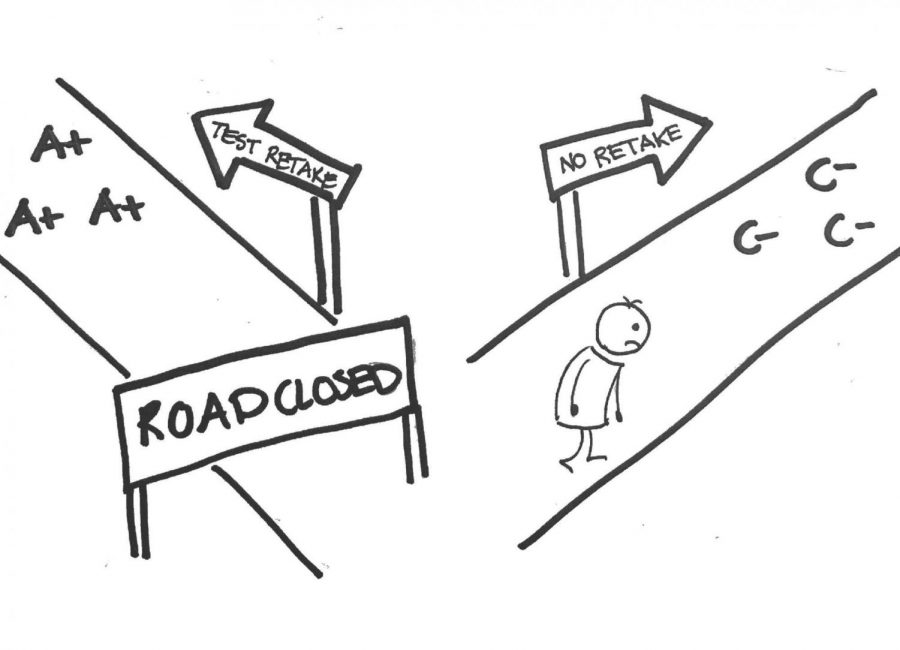Correcting The Test-Taking System
March 6, 2020
“The world is so soft nowadays,” said Coach Healy.
He turned around from his seat on the bus to look at myself and my teammates in the eyes. After asking us all if our teachers offered the option for test retakes, he had come away with this conclusion. “Second chances are hard to come by in the real world,” he said, as we drove down the road back to Tiger Trail.
It has become evident that schools are more concerned with offering opportunities to increase learning rather than simulating the real world where “second chances” are limited. Due to this mentality, the affinity for test retakes is seemingly here to stay.
A survey conducted with more than 50 responses from Wheaton Warrenville South High School students showcases the prevalence of test retakes and corrections in the current school system. More than 85% of those surveyed said that at least one of their classes offered the opportunity to retake tests or correct incorrect answers on tests for extra points.
With these newfound opportunities for extra points, critics have questioned whether these retakes are a realistic simulation for the real world and the supposed lack of second chances there are. However, as shown by the 86.5% of survey takers who said they believe that teachers of core classes should offer the option to retake tests, students are thankful and supportive of the test corrections era.
“Retakes are really beneficial because if you’re having an off day or don’t understand the content the first time, you get another chance to learn it and improve,” said Wheaton Warrenville South Student, Izzy Fawcett. That idea is the real benefit of retakes: tests can be such an impactful part of your overall grade that it can be extremely disheartening to see your grade plummet due to one bad performance in a 170+ day school year. That is why these second chances can be so important: they help schools keep the focus on learning and subject mastery rather than on cramming for the sake of a good grade.
Even though students seem to be a fan of test retakes, not everyone shares their enthusiasm. “Students don’t study more,” said teacher Misty McClaskey in an interview with Edutopia. “They do just as bad or worse on the retake. That’s a waste of my time and theirs. And I have found if they know a retake is available, they actually study and prepare less.” This sentiment exposes a potential natural weakness in the human psyche: we tend to prepare less for obstacles when we know a second chance is readily available and waiting. Due to this inherent flaw, teachers are left with two options: either refuse to offer retakes or find ways to limit their potential impact while still allowing for a focus on learning.
The problems with retakes are well-known and very true: when offered, students often take advantage of retakes. However, this issue can be lessened with the way the retakes are administered. “It remains controversial, but most teachers withheld full credit for retakes—though a wide range of standards for partial credit emerged,” suggests Edutopia.” “Some averaged the two grades, while others established a maximum possible score.”
Another necessity for administering test retakes is simply changing the tests from the original date to the retake. “Students often gamed the system, failing the initial exam to see what it looked like—and then simply regurgitating the correct answers later,” stated Edutopia. If the form of the test is not changed, then no learning will take place, but, rather, only the memorization of answers will occur, undermining the process as a whole.
Another idea for potential ways to introduce test retakes without potentially corrupting the whole system was found in the survey of Wheaton Warrenville South students. “I think one retake per semester can be beneficial, but if they are too often it disincentivizes studying,” suggested South student Ben Gorski.
To the delight of many students, test retakes are here to stay. However, they are not without their flaws, as they have the potential to be taken for granted or taken advantage of. Because of this, it is up to the teachers to decide the best ways to administer retakes or else the learning environment could be compromised.


